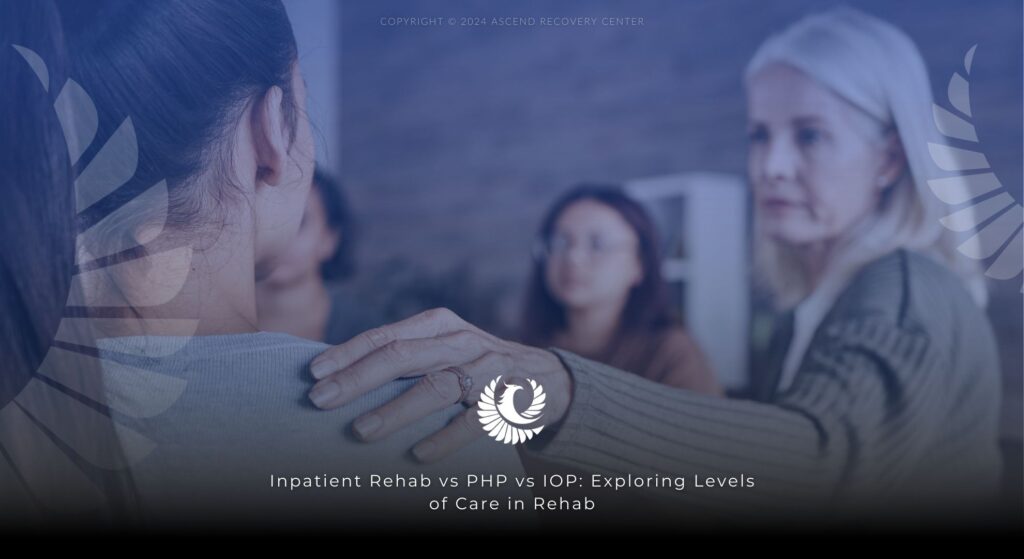Living with addiction is challenging. People who struggle with substance abuse and addiction often face short and long-term consequences. They may face serious health complications, lose relationships, or struggle to function in daily life.
Effective addiction treatment is available. If you or someone you love struggles with substance abuse, you must seek treatment. A comprehensive treatment program will provide the treatment and support you need to quit using addictive substances. You will also develop essential skills to avoid relapse.
People’s needs during treatment can vary quite a bit. There are several levels of addiction treatment available to meet people’s different needs.
This article will explore several standard levels of care in rehab. You will learn what to expect from each level of care and where to find treatment.
Reach out to the Ascend Recovery Center team to learn about our comprehensive treatment programs. Our intake staff can verify your insurance, answer questions, and help you schedule an intake appointment.
Inpatient Treatment: What to Expect
Inpatient treatment is the most intensive level of addiction treatment. In a residential treatment program, you will live in the treatment center while receiving care.
Inpatient substance use disorder programs benefit people who require intensive, round-the-clock supervision and treatment. During inpatient care, patients follow a tailored treatment plan.
Many people begin inpatient care with a medically supported detox program. During detox, medical and mental health specialists monitor patients’ withdrawal symptoms and provide treatment as needed. Detox treatment may include:
- Medications to reduce cravings and other withdrawal symptoms
- Emotional support
- Mental health treatment, including individual and group therapy
- Round-the-clock supervision and access to treatment
- Holistic therapies, including massage, nutrition support, and mindfulness
After completing detox, patients begin to follow a comprehensive treatment plan. Specialized treatment plans meet each person’s unique needs. Plans may include:
- Individual, group, and family therapy
- Behavioral health therapies, including cognitive behavioral therapy (CBT)
- Mental health treatment
- Medical care
- Relapse prevention education
- Aftercare planning
Inpatient programs take place in a hospital setting. This level of care benefits:
- People with long-lasting addictions
- Those who need intensive mental health or medical treatment
- People who have not maintained sobriety in outpatient programs
- Those who would benefit from a secure, structured environment during the earliest days of recovery
Many people begin treatment in an inpatient program and then transition into outpatient care.
Partial Hospitalization Program (PHP): What to Expect
A partial hospitalization program (PHP) is the most intensive outpatient level of care in addiction treatment. A PHP’s schedule mirrors the rigorous schedule of inpatient care but allows patients to live at home during treatment.
PHP participants may spend 5-6 hours per day in treatment sessions up to five days a week. This intensive schedule can make it challenging to continue working or attending school. However, the flexibility of outpatient care may allow people to remain connected to their support networks.
Partial hospitalization treatment plans provide many of the same therapies as inpatient care. A PHP treatment plan may include:
- Individual therapy
- Behavioral therapies
- Medication management
- Family therapy
- Group therapy
- Mental health screenings and treatment
- Holistic therapies, including art therapy, exercise, mindfulness, and more
A PHP may be most beneficial for people who:
- Have completed inpatient care
- Require significant support to prevent relapse
- Have co-occurring mental health conditions
- Have not been able to avoid relapse with lower levels of treatment
A PHP provides high-quality, intensive treatment and support. This can allow people to work toward long-term recovery from addiction.
Intensive Outpatient Programs (IOP): What to Expect
Intensive outpatient programs (IOP) are an outpatient level of addiction treatment. People may attend an IOP after completing an inpatient program or PHP.
An intensive outpatient program provides essential support and treatment people need to prevent relapse. IOP participants typically attend treatment sessions 3-5 days a week for several hours a day.
An IOP treatment plan may include:
- Individual counseling
- Behavioral therapy
- Group therapy
- Family therapy
- Relapse prevention education and coping skills
- Holistic therapies, including yoga, nutrition support, mindfulness, and more
- Aftercare planning
An intensive outpatient program may be beneficial for people who:
- Have completed more intensive levels of treatment
- Do not require 24/7 access to treatment or supervision
- Do not have intensive mental health or medical needs
- Are not in active withdrawal or experience intense cravings
An IOP may be an ideal option for people who require consistent support but do not require more intensive treatment options. IOP participants receive high-quality care while continuing to live at home or in a sober living community.
Inpatient Rehab vs PHP vs IOP: Which Level of Care Do I Need?
Substance use disorder treatment is not a one-size-fits-all process. If you need help to overcome substance abuse or addiction, you need tailored treatment. But what level of care do you need?
Before you begin treatment, a doctor or addiction specialist will assess your needs. The assessment may consist of:
- A mental health and medical history
- Information about your past and current substance use
- A family history of addiction
- Lab testing
- A physical examination
Your treatment team will use this information to determine which level of care meets your needs.
Contact the Ascend Recovery Center specialists now to explore your treatment options. Our intake specialists can help you determine what type of care you need and schedule an intake. Contact us today to begin your recovery journey.








